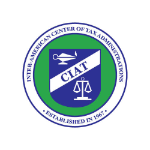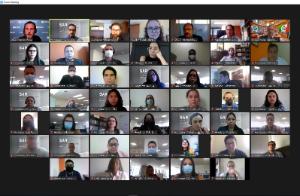CIAT and TIWB collaborate to fight tax crime in Latin America
by CIAT and TIWB Secretariats
7 July 2021
|
The Inter-American Center of Tax Administrations (CIAT) and Tax Inspectors without Borders (TIWB) have embarked on a new collaboration in the fight against tax and financial crime in Latin America.
Criminal tax investigation is of particular interest for many Latin American countries, especially for those who are signatories of the Punta del Este Declaration (Declaration), a commitment to tax transparency, exchange of information and the fight against illicit financial flows (IFFs) through a multi-pronged strategy. As reported by CIAT, IFFs are of concern to all countries, but particularly to developing countries, as they strip governments of much needed resources that could help finance the Sustainable Development Goals. These issues are at the very heart of the current global agenda. Latin American and Carribean (LAC) countries are estimated to substantial sums annually due to cross-border tax abuse issues. |
 |
CIAT had participated in the ministerial deliberations held at Punta del Este, Uruguay, leading to the drafting of the Declaration and continues to offer support it through a strong co-operation agenda for countering IFFs with LAC member countries. The main areas of support are tax risk assessment, tax intelligence, control of multinational enterprises and international transactions, tax collection processes, tax transparency and exchange of information, electronic invoicing systems, development of human resources, and general technology issues associated to tax administration processes. One of the most important CIAT initiatives has the objective to facilitate the collection of indirect taxes originated in cross-border transactions that involve digital goods and services, where the seller does not have a physical presence in the destination country. For this purpose, CIAT, with the support of NORAD, has developed a software called Digital Economy Compliance (DEC), that facilitates the registration, declaration and payment processes for taxpayers. The CIAT work in the LAC region further focuses on strengthening key processes of tax administrations. It allows addressing audits with greater success, which is fully in line with the efforts of TIWB. |
|
Now, TIWB Criminal Investigation (TIWB-CI) pilot programmes aim to tackle many of these issues by way of hands-on technical assistance between Host and Partner Administrations. Local and global partners provide in-depth and tailored expertise to help solve issues of criminal tax fraud and financial crime. In the framework of the OECD’s Ten Global Principles for Fighting Tax Crime (Ten Global Principles), TIWB-CI participants discuss issues of risk, strategy, data and statistical analysis, international co-operation, inter-agency co-operation, legal and policy frameworks, and criminal justice issues, among others. The in-depth analysis through the self-assessment diagnostic tool, the Tax Crime Investigation Maturity Model (Maturity Model), helps countries measure their implementation of the Ten Global Principles. Based on results from the Maturity Model self-assessment, a Gap Analysis and Action Plan report is developed to highlight areas for the Host Administration to enact reforms.
Following such analysis, TIWB-CI technical assistance programmes has two major components:
|
|
The initiative is currently conducting seven pilot TIWB-CI programmes and two more will start shortly. Three of these programmes are in Latin America (Colombia, Costa Rica and Honduras). Collaboration between CIAT and TIWB will allow countries to further progress the fight against tax and financial crimes in the region. For example, Honduras tax crime officials are working with five dedicated experts from the Fiscal Prosecutor’s Office of Mexico to implement on recommendations set forth in the Action Plan and investigate specific cases of tax crime.
On 12-16 April 2021, Stefano Gesuelli, Head of the Italian Mission to CIAT, with delegates from Mexico, led a workshop whereby officials from Honduras’ tax administration and the Public Prosecutor’s Office conducted the Maturity Model self-assessment. This exercise serves as the basis for the TIWB-CI programme in Honduras. The workshop included extensive working group discussions on the Ten Global Principles’ implementation status, detailed presentations, and follow-up actions for officials. The results from this self-assessment workshop will guide recommendations for casework and capacity-building efforts for criminal investigations under the TIWB-CI programme. |
TIWB-CI Honduras workshop, April 2021 |
|
Discussions revealed a range of insights, and CIAT’s expertise in Latin America allowed for tailored recommendations. According to Col. Gesuelli, "more active co-operation between countries in discussing how to tackle IFFs will enhance our efforts in building a fair global market and, as a consequence, improve tax administrations’ skill and capacity". To give a concrete example of the findings, 2 of the 21 recommendations from the self-assessment process include building a national tax crime investigation strategy and preparing a policy brief suggesting reforms in asset recovery policies.
According to Nilimesh Baruah, Senior Adviser in the Tax and Crime Unit and responsible for TIWB-CI programme co-ordination at the Centre for Tax Policy and Administration at the OECD, "CIAT’s participation in the Honduras workshop made the Maturity Model self-assessment one of the most successful diagnostic analyses yet." Reiterating the motivation to have more such programmes in Latin America leveraging the collaboration and support of CIAT, Mr. Marcio Ferreira Verdi, Executive Secretary of CIAT, offered CIAT’s full support to the initiative at the formal launch of the TIWB-CI Honduras programme on 8 June 2021. Such South-South co-operation is beneficial to all countries involved and will reinforce efforts to fight criminal tax evasion in the region.
The expected benefits of TIWB-CI programmes include improved taxpayer compliance, a strategic approach to combatting IFFs, enhanced enforcement of tax crimes by natural and legal persons (including professional enablers), improved prevention and detection, dissuasive sanctions and recovery of proceeds of crime, and better international co-operation in the global fight against IFFs. These outcomes are expected to more generally lead to improved domestic resource mobilisation and financing for sustainable economic development in LAC and across the globe. |
Related Documents


